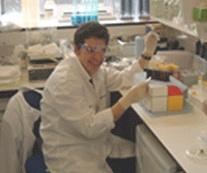
Jose Bayascas validates PDK1 as an anti-cancer target
Many cancers possess an elevated activity of the protein kinases PKB/Akt and S6K, which is believed to drive the proliferation, growth and survival of these cells. Pharmaceutical companies are devoting a considerable effort to develop drugs that would inhibit PKB and S6K activity for the treatment of such tumours. We have speculated that drugs that inhibit PDK1 might have anti-cancer properties, but there was little evidence to support this notion. In order to test this hypothesis, Jose Bayascas in our Unit, generated mice that express approximately 10-fold lower levels of PDK1 similar to the situation of an animal treated with a specific PDK1 inhibitor.
Jose crossed these mice to PTEN+/- mice that develop numerous tumours as a result of having elevated PKB and S6K activity. Excitingly, Jose in collaboration with Stewart Fleming at Ninewells Hospital, discovered that the PTEN+/- mice with reduced expression of PDK1, were markedly protected from developing a wide range of tumours. These findings provide strong evidence that PDK1 is a central mediator of cancer resulting from loss of PTEN and also suggest that PDK1 is a promising anti-cancer target for the prevention of tumours that possess elevated PKB and S6K activity. We hope that this study will motivate pharmaceutical companies to develop PDK1 inhibitors for cancer therapy. For a copy of Jose's paper click here
Jose crossed these mice to PTEN+/- mice that develop numerous tumours as a result of having elevated PKB and S6K activity. Excitingly, Jose in collaboration with Stewart Fleming at Ninewells Hospital, discovered that the PTEN+/- mice with reduced expression of PDK1, were markedly protected from developing a wide range of tumours. These findings provide strong evidence that PDK1 is a central mediator of cancer resulting from loss of PTEN and also suggest that PDK1 is a promising anti-cancer target for the prevention of tumours that possess elevated PKB and S6K activity. We hope that this study will motivate pharmaceutical companies to develop PDK1 inhibitors for cancer therapy. For a copy of Jose's paper click here

